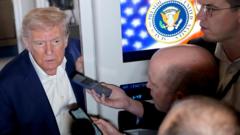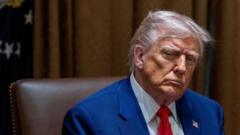In recent days, yields on U.S. Treasuries have surged in response to newly implemented tariffs, prompting fears of a potential credit crisis similar to that faced by Britain under former Prime Minister Liz Truss. The striking similarities between the economic reactions to President Donald Trump's aggressive tariff strategy and Truss's controversial tax cut proposal may indicate broader implications for U.S. fiscal policy, analysts suggest.
### Rising U.S. Treasury Yields Signal Economic Concerns, Echoing Liz Truss's Downfall

### Rising U.S. Treasury Yields Signal Economic Concerns, Echoing Liz Truss's Downfall
As tariffs heighten tensions, the bond market exhibits troubling signs reminiscent of the UK's political turmoil in 2022, leading analysts to question the stability of U.S. financial policies.
President Trump's decision to impose significant tariffs on China has led to a rapid increase in the yield of 10-year U.S. Treasuries, rising from 3.9 percent to 4.5 percent shortly thereafter, while the 30-year bond exceeded 5 percent briefly. This shift raises concerns about the traditional status of U.S. government bonds as safe havens during economic uncertainty. In contrast, Truss's government dealt with a swift decline in confidence, ultimately resulting in her resignation after just 44 days in office due to market backlash over her proposed tax cuts.
As markets become increasingly volatile, experts are calling for the Federal Reserve to consider intervention to stabilize the financial environment, echoing actions taken by the Bank of England in 2022. Unlike Truss, who yielded to market pressures and rescinded her tax cuts, Trump has not indicated any intention to revise his tariff strategy. If the current trend continues without any policy adjustments, the economic fallout could mirror that of the UK, amplifying scrutiny on the American economy's resilience and the government's ability to manage crises effectively.
As markets become increasingly volatile, experts are calling for the Federal Reserve to consider intervention to stabilize the financial environment, echoing actions taken by the Bank of England in 2022. Unlike Truss, who yielded to market pressures and rescinded her tax cuts, Trump has not indicated any intention to revise his tariff strategy. If the current trend continues without any policy adjustments, the economic fallout could mirror that of the UK, amplifying scrutiny on the American economy's resilience and the government's ability to manage crises effectively.























